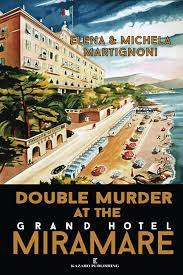9781948104241
Kazabo Publishing, 2023
originally published as Doppio delitto al Miramare, 2015
178 pp
paperback
I really enjoy reading translated fiction, no matter the genre. My last couple of reads (outside of crime) came from Argentina and Mexico, and I'm always delighted when something new in translation comes along. I'm not quite sure who specifically translated this book, Double Murder at the Grand Hotel Miramare, but there is a baker's dozen of translators listed as being on the translation team, which is something I hadn't encountered before. According to goodreads, this book is number five of the thirteen in the series featuring Deputy Assistant Chief of Police Luigi Berté, written by these two women under the name of Emilio Martini. [sidebar: one of the books on the goodreads list is shown as number 4.5 so I have no idea what that means, exactly -- how do you write half a book?] It's always tough starting a series that's obviously well underway, and although the authors allude to some past events in Berté's life (a messy breakup, some sort of trouble in Milan and a move to his current location in Lungariva along the Ligurian coast), I feel like I didn't quite have the entire story, which was a wee bit frustrating; on the other hand, the holes in my knowledge didn't exactly hinder my reading experience too much so it was okay.
It's Easter Monday, and Berté has his heart set on both a wonderful lunch at the Pensione Aurora and seeing Marzia, the married woman with whom he is in a secret relationship. But, as he says after a phone call from his sergeant, "a double murder has a way of distracting you from your thoughts, as well as ruining your plans." Called to the luxe Hotel Miramare, he finds the two victims, "permanent guests" there, together in bed in one of the hotel rooms, evidently shot while sleeping by someone in a "blind rage" who was neither a professional nor someone too familiar with the use of weapons. Both of them are employed by Countess Licia Trevisan, a very wealthy woman whose husband, the Count Van Der Meer, had made his fortune in South Africa. She is, as the manager notes, "one of our most important clients." The male victim is Roberto Sommariva, an accountant, while the female victim, Ornella Ferrari, is the Countess' secretary. After talking to his boss, Berté learns that along with his regular colleagues Pasquale Parodi and Francesca Belli, he has been assigned help from a homicide unit and a forensics team from Genoa. He will need it -- not only is the hotel packed with guests who are all potential suspects, but the Countess, who may just be a suspect herself, is being rather tight lipped with the police. And quite frankly, she rubs Berté the wrong way from the start. As the two teams get to work, they discover that there is plenty of motive to go around; the further they get into the investigation, they realize that there are also plenty of secrets being kept that need to be unraveled if there is any hope at all of catching the killer.
 |
| from Corbaccio |
I enjoyed this book so much that when I'd finished it, I asked Chiara from Kazabo if any more of these books had been translated. I got a no for an answer, but the point is that I was ready to hit the buy button if they had. There's a lot to like here, beginning with the main character, who banters with his conscience that he's named "The Bastard" (whose words appear in italics), who is constantly razzed about this ponytail, and who has a good working relationship with his two main colleagues as well as with the team from Genoa. Berté has a temper, can get angry in his job and likes to do things his way; at least he's smart enough to realize that in this investigation at least, there are times when he's walking on thin ice. Like his father, also a member of the police force, he is a huge fan of detective novels, and the authors have scattered different titles and writers throughout the novel that shed light on Berté's favorites (and obviously, their own influences in crime writing). I also want to highlight the fact that the core mystery itself connects distant past with present, which I love in a novel of any genre. And while there is romance involved here, it's not so distracting as to mess with the investigation/crime solving narrative, which I've seen happen all too often. Finally, Double Murder at the Grand Hotel Miramare is a nicely-plotted, old-fashioned murder mystery written without gore or gratuitous sex, making it a pleasure to read. How often does that happen these days if you're not a cozy reader?
I would like to thank Chiara for offering me the opportunity to read this novel and sending me an e-pub version, which I promptly forgot about until her much-needed but gentle nudge made me feel so guilty about sitting on it that I actually bought a copy. I love what Kazabo does, offering crime fiction (and other books) in translation from authors whose work has not yet reached an English-speaking readership. I would recommend this book to anyone who is a fan of translated crime/mystery fiction, as well as to readers who just want to curl up with a good mystery novel where the focus is actually on the mystery itself.

No comments:
Post a Comment
I don't care what you write, but do be nice about it